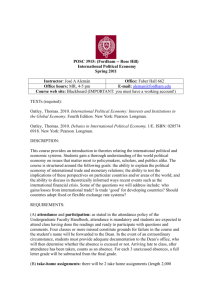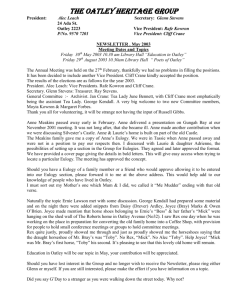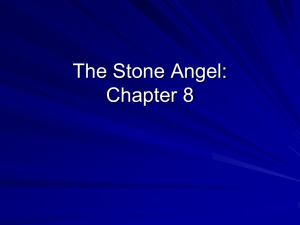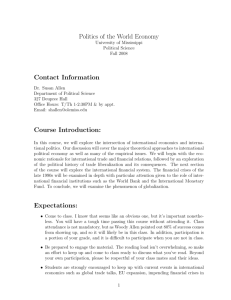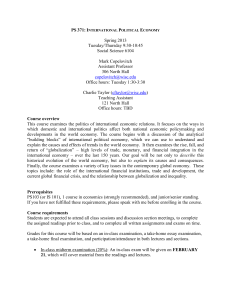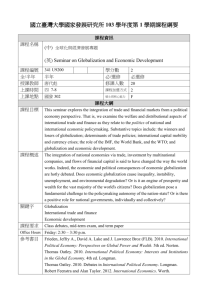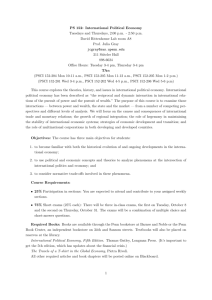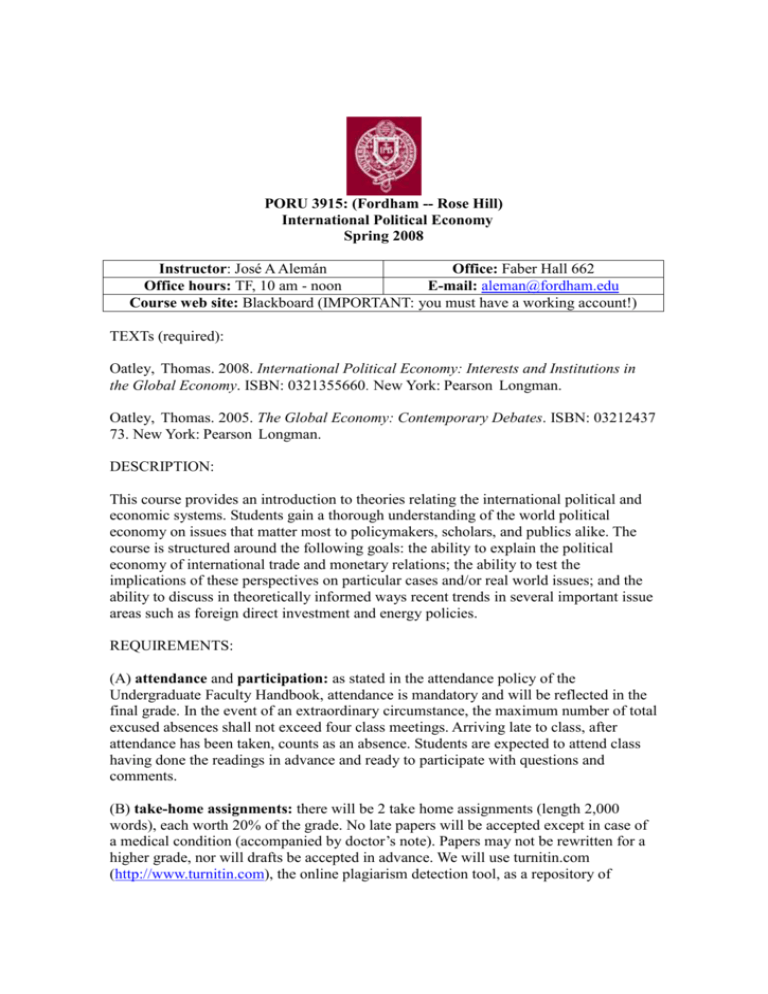
PORU 3915: (Fordham -- Rose Hill)
International Political Economy
Spring 2008
Instructor: José A Alemán
Office: Faber Hall 662
Office hours: TF, 10 am - noon
E-mail: aleman@fordham.edu
Course web site: Blackboard (IMPORTANT: you must have a working account!)
TEXTs (required):
Oatley, Thomas. 2008. International Political Economy: Interests and Institutions in
the Global Economy. ISBN: 0321355660. New York: Pearson Longman.
Oatley, Thomas. 2005. The Global Economy: Contemporary Debates. ISBN: 03212437
73. New York: Pearson Longman.
DESCRIPTION:
This course provides an introduction to theories relating the international political and
economic systems. Students gain a thorough understanding of the world political
economy on issues that matter most to policymakers, scholars, and publics alike. The
course is structured around the following goals: the ability to explain the political
economy of international trade and monetary relations; the ability to test the
implications of these perspectives on particular cases and/or real world issues; and the
ability to discuss in theoretically informed ways recent trends in several important issue
areas such as foreign direct investment and energy policies.
REQUIREMENTS:
(A) attendance and participation: as stated in the attendance policy of the
Undergraduate Faculty Handbook, attendance is mandatory and will be reflected in the
final grade. In the event of an extraordinary circumstance, the maximum number of total
excused absences shall not exceed four class meetings. Arriving late to class, after
attendance has been taken, counts as an absence. Students are expected to attend class
having done the readings in advance and ready to participate with questions and
comments.
(B) take-home assignments: there will be 2 take home assignments (length 2,000
words), each worth 20% of the grade. No late papers will be accepted except in case of
a medical condition (accompanied by doctor’s note). Papers may not be rewritten for a
higher grade, nor will drafts be accepted in advance. We will use turnitin.com
(http://www.turnitin.com), the online plagiarism detection tool, as a repository of
written assignments. See blackboard for further details.
(C) mid term and final examinations: exams will be done in class. Cheating (using
unauthorized materials or giving unauthorized assistance during an examination or other
academic exercise) and plagiarism (using others' ideas and words without
acknowledgment) are serious offenses and will be forwarded to the Dean.
EVALUATION:
(A) attendance and class participation: 10%
(B) take-home assignments: 40%
(C) midterm examination: 25%
(D) final examination: 25%
On all papers and exams, evaluation is based on a thorough understanding and
command of the materials presented in lectures and readings, original critical analyses
of those materials, and an attempt to think about how those ideas make sense of
particular countries or experiences in the real world.
- “A” grades will be awarded to work that accomplishes these goals.
- “B” grades will be awarded to work that manages to accomplish some of these
goals.
- “C” grades will be awarded to work that manages to accomplish only one of these
goals adequately.
- Reasonable attempts to complete the assignments, but with virtually no success
will be awarded “D” grades.
- “F” grades will be recorded for assignments that are not completed in a remotely
acceptable manner.
RESOURCES:
(A) books: the above list of texts are required and available for purchase at the Fordham
University bookstore or on reserve at Walsh library. Additional handouts and readings
will be made available online through blackboard.
(B) Blackboard: each student must obtain a blackboard account (directions attached).
This is a web-based platform used to administer course announcements and grades, and
additional course materials.
(C) special assistance: students with disabilities should contact the instructor at the
beginning of the semester to allow for coordination of assistance with the Office of
Disability Services (ODS). Students in need of assistance with class assignments should
contact or visit the Writing Center (x4032) located in Dealy E-533.
Course schedule
1/15
1/18
1/22
1/25
1/29
2/1
2/5
2/8
2/12
2/15
2/19
2/22
2/26
2/29
3/4
3/7
3/11
3/14-3/21
3/25
3/28
4/1
4/4
4/8
Introduction. What is IPE?
(no readings)
Traditional Schools of International Political Economy
Oatley (chapter 1)
The World Trading System: Origins
Oatley (chapter 2)
The World Trading System: Contemporary Challenges
Oatley (chapter 2)
Economic Case for Trade
Oatley (chapter 3)
The Economic Impact of Trade
Scott, Irwin, and Cavanagh
The Politics of Trade Cooperation
Oatley (chapter 3)
The Doha Round: The WTO under Fire
Bhagwati
Domestic Politics of Trade
Oatley (chapter 4)
The WTO and Political Legitimacy
Esty, Henderson
No class – University follows a Monday schedule
Political Institutions and Interests
Oatley (chapter 4)
States and Industrial Policy
Oatley (chapter 5)
review
Midterm examination
MNCs in the Global Economy
Oatley (chapter 8)
The Politics of MNCs
Oatley (chapter 9)
Spring recess – no class
MNCs and Sweatshops
Krugman, Miller
Regulating MNCs
Amsden (chapter 9)
The Race to the Bottom
Spar and Yoffie, Drezner
The Bretton Woods System
Oatley (chapter 10)
The Unholy Trinity
Oatley (chapter 11)
4/11
4/15
4/18
4/22
4/25
4/29
The Unholy Trinity
Oatley (chapter 11)
The European Monetary System
Oatley (chapter 11)
Electoral Models of Monetary Politics
Oatley (chapter 12)
Partisan Models of Monetary Politics
Oatley (chapter 12)
Monetary Policy and Unemployment
Oatley (chapter 13)
review

